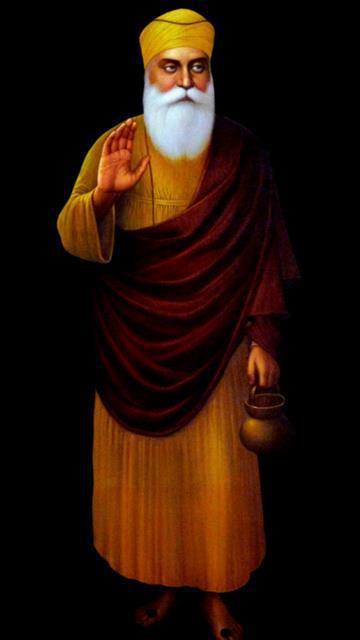The history of Sikh religion starts with the birth of Guru Nanak Dev Ji, the founder of Sikh religion, on April 14, 1469 at Rai-Bhoi-di Talwandi (now in Pakistan) presently known as Nankana Sahib in the house of Mehta Kalyan Das (Methta Kalu Ji) and Mata Tripta Ji. Guru Nanak had one elder sister, named Bebe Nanaki Ji, who loved Guru Nanak not only as brother, but also adorned him as a spiritual guide. Such a realization had also occurred in the mind of Rai Bular, the ruler of that area. From his very childhood, Guru Nanak Dev Ji, discarded all kinds of rituals and superstitions and explained to the people the concept of true religion. He gave his trio principles of Kirt Karni (earning one’s own living), Naam Japna (Meditation on the name of God), and Wand Chhakna (Sharing with other needy persons). He composed divinely inspired hymns in praise of the Lord and delivered his message of oneness of God and universal brotherhood by undertaking long journeys on foot in the company of a companion, named Bhai Mardana Ji, who was a rebec player and played the instrument whenever and wherever the Guru sang his compositions written in praise of God.
He impressed upon the people that the best way to serve God was to love and serve his creation. He criticized idol worship and advocated the life of a householder. During the journeys, Guru Ji met the religious leaders of Hinduism and Islam and discussed with them his views on true religion which made a Hindu, a better Hindu and a Muslim, a better Muslim. He also met those people who were not even human in their approach, and lived their lives by wicked and cruel ways. He redeemed such persons like Sajjan Thug and Koda Rakshas.After completing his long missionary journeys which not only covered India but also the places like Assam, Sri Lanka, Tibet and Mecca, which were beyond our frontiers, he settled at Kartarpur Sahib (now in Pakistan) and spent his life with his family and earned by doing farming. As a social reformer, he upheld the cause of women, down trodden, poor and helpless people, For religious activity, he started Dharamsals at different places wherever he went and also at Kartarpur where a big congregation was held in his presence, both in the morning and evening. Gurbani kirtan and mutual discussions were held. Bhai Gurdas Ji,The First sikh scholar , bears a testimony to the fact of establishment of Dharamsals at different places visited by the Guru in the following words :

